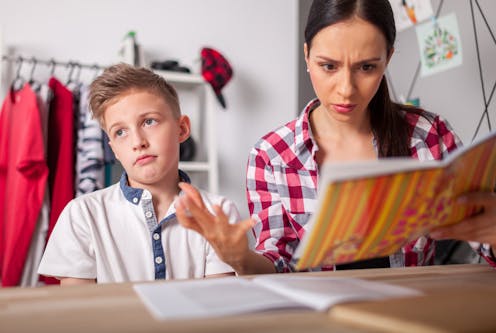Schooling in lockdown isn't home schooling – but we can learn from the real thing
- Written by Nicole (Nikki) Brunker, Lecturer in Education, University of Sydney

Adding to the clamour of argument over whether schools should be open to all during lockdown is confusion in terminology. Using the term “home schooling” to describe schooling during lockdown is disrespectful to both teachers and home schoolers.
Home schooling requires parents to seek registration for their child to not attend school. These parents are then required to develop and implement learning with their children. That is a far cry from the situation for students enrolled at school who have been temporarily learning at home during lockdown in Sydney and, until July 28 when restrictions eased, in Victoria and South Australia.
Nonetheless, home schooling does offer parents lessons in how to support schooling from home. This article includes five essential tips drawn from home schooling.
Schools are offering support
Families have been provided with enormous support during lockdowns. They are encouraged to contact the school with any specific needs they might have. Teachers and schools have enabled schooling during lockdown through online classes, independent learning activities, printed learning materials and other resources to support the learning within a class.
School during lockdown takes many different forms to provide individual and class-based learning opportunities. Schools can provide additional support to meet diverse student (and family) needs.
Support necessarily looks different across schools. Each school works with families to determine and meet their needs. The support from schools ranges from surveys and individual phone calls, online one-on-one learning support sessions, walk-by pick-up of printed materials and resources such as stationery and art supplies, to home delivery of technology and even food.
Schools have learned from the experience of 2020, creating the best way forward for their communities when lockdowns prevent learning in a physical classroom.
Beyond schools, education systems and many school-related organisations are providing extensive resources to support schooling during lockdown. They are offering virtual excursions, videos and print activities that are downloaded or posted.
To suggest that schooling during lockdown is home schooling disregards the enormous, valuable work every teacher and school staff member is providing.
Yes, parents are required to do more than they usually need to when their children are physically attending school. It still doesn’t make it home schooling.
Home schooling is a big step
Home schooling is a big step outside the schooling system. It’s a step outside the free support and resources from teachers and schools – parents do it all.
To be permitted to home-school, parents must seek registration with the National Education Standards Authority (NESA). They must adhere to all of the curriculum requirements that schools must meet.
Parents must interpret the curriculum documents and assessment requirements to select and design appropriate learning opportunities for their children. They must implement assessment processes. They must maintain accurate records of learning and achievement.
Contrary to a common assumption, home-schooled children are well socialised. They are engaged in a vast array of shared learning within and beyond the home. Excursions, sports carnivals, performances, workshops, social gatherings and more feature constantly within the home-schooling community.
When states lock down, what cannot be moved online is in limbo. The best that can be hoped for is postponement. This means home schoolers feel the pressure of lockdown along with every other parent and child right now.
To sum up, home-schooling parents must do everything that teachers, schools and education systems are doing in enabling schooling during lockdown, as well as what many parents are now facing with their children at home.
Lessons from home schooling
So, what can we learn from home schooling as we juggle working from home with children schooling at home during lockdown?
Children are always learning (and succeeding). So value the immense learning that occurs through play, and build on the incidental learning that arises.
A six-hour school day is made up of many different things and does not equate to a six-hour day of schooling at home. We need to shift our view of what learning looks like, be flexible, value what might seem like a “distraction” and recognise not everything prepared by school will be finished.
Support independence by drawing on interests to build skills for self-organisation. This could involve setting a daily Lego challenge, or building a bridge that spans 15cm, or a vehicle that moves without wheels, or a marble run, or a boat that floats. Remember that supporting their learning means not doing it for them.
Resources are available everywhere. From the home-delivery boxes taking over the living room to the exponential growth in online sources, everything offers an opportunity for learning. For example, why not gather paper and card from the recycling for paper plane challenges using different types and sizes of paper? And when your child needs help with maths go online.
Don’t try to do it all yourself. Collaborate with friends, family and parents in your child’s class to rotate regular online gatherings hosted by a parent. It could be a social gathering, shared reading, maths problem solving, completing a school activity together, music activity, art activity and so on. This will give every other parent time to work.
Correction: this article originally referred to the National Education Standards Authority (NESA), which has been corrected to NSW Education Standards Authority (NESA).
Authors: Nicole (Nikki) Brunker, Lecturer in Education, University of Sydney





